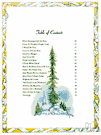contents
Also found in: Thesaurus, Medical, Legal, Financial, Acronyms, Idioms, Encyclopedia, Wikipedia.
con·tent 1
(kŏn′tĕnt′)n.
1. often contents Something contained, as in a receptacle: the contents of my desk drawer; the contents of an aerosol can.
2. often contents
a. The individual items or topics that are dealt with in a publication or document: a table of contents.
b. The material, including text and images, that constitutes a publication or document.
3.
a. The substance or significance of a written work, especially as contrasted with its form.
b. Information, such as text, video, and sound, usually as contrasted with its format of presentation: a television producer looking for content that was more entertaining.
4. The proportion of a specified substance: Eggs have a high protein content.
[Middle English, from Medieval Latin contentum, neuter past participle of Latin continēre, to contain; see contain.]
con·tent 2
(kən-tĕnt′)adj.
1. Desiring no more than what one has; satisfied.
2. Ready to accept or acquiesce; willing: She was content to step down after four years as chief executive.
tr.v. con·tent·ed, con·tent·ing, con·tents
To make content or satisfied: contented himself with one piece of cake.
n.
Contentment; satisfaction.
[Middle English, from Old French, from Latin contentus, past participle of continēre, to restrain; see contain.]
American Heritage® Dictionary of the English Language, Fifth Edition. Copyright © 2016 by Houghton Mifflin Harcourt Publishing Company. Published by Houghton Mifflin Harcourt Publishing Company. All rights reserved.
ThesaurusAntonymsRelated WordsSynonymsLegend:
Switch to new thesaurus
| Noun | 1. |  contents - a list of divisions (chapters or articles) and the pages on which they start contents - a list of divisions (chapters or articles) and the pages on which they startpublication - a copy of a printed work offered for distribution table, tabular array - a set of data arranged in rows and columns; "see table 1" |
Based on WordNet 3.0, Farlex clipart collection. © 2003-2012 Princeton University, Farlex Inc.
Translations
فهرسمُحْتَوياتمُحْتَوَياتمُحْتَوَيات الكِتاب، فَهْرَس
obsah
indholdindholdsfortegnelse
sisältö
sadržaj
tartalom
efnisyfirlitinnihald
目次
목차
kazalo vsebinevsebina
innehåll
จำนวนสิ่งของที่บรรจุอยู่
içindekileriçerikiçinde bulunan şeyler
vật chứa bên trong
content2
(ˈkontent) noun1. the subject matter (of a book, speech etc). the content of his speech.
2. the amount of something contained. Oranges have a high vitamin C content.
ˈcontents noun plural1. the things contained in something. He drank the contents of the bottle.
2. a list of the things contained especially in a book. Look up the contents at the beginning of the book.
Kernerman English Multilingual Dictionary © 2006-2013 K Dictionaries Ltd.
contents
→ مُحْتَوَيات obsah indhold Inhalt περιεχόμενα contenido sisältö contenu sadržaj contenuto 目次 목차 inhoud innhold spis treści conteúdo содержимое innehåll จำนวนสิ่งของที่บรรจุอยู่ içindekiler vật chứa bên trong 所含之物Multilingual Translator © HarperCollins Publishers 2009